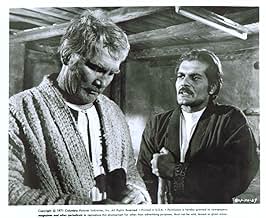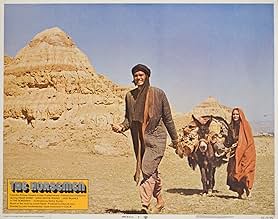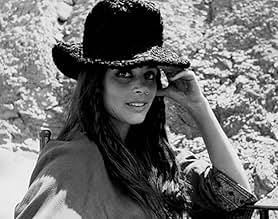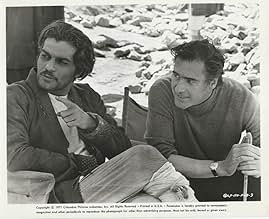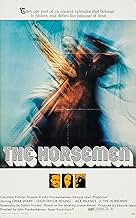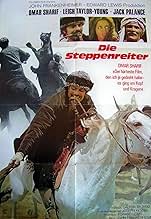IMDb RATING
6.2/10
1.4K
YOUR RATING
Drama depicting rural life in contemporary Afghanistan and the Afghani people's love for an ancient traditional sport similar to horseback polo.Drama depicting rural life in contemporary Afghanistan and the Afghani people's love for an ancient traditional sport similar to horseback polo.Drama depicting rural life in contemporary Afghanistan and the Afghani people's love for an ancient traditional sport similar to horseback polo.
- Director
- Writers
- Stars
Salmaan Peerzada
- Salih
- (as Salmaan Peer)
Aziz Resham
- Bacha to Ghulam
- (as Aziz Resh)
Vida St. Romaine
- Gypsy Woman
- (as Vida St Romaine)
Florencio Amarilla
- Arabian Man
- (uncredited)
Ishaq Bux
- Amjad Kahn
- (uncredited)
Carlos Casaravilla
- Messenger
- (uncredited)
- Director
- Writers
- All cast & crew
- Production, box office & more at IMDbPro
Featured reviews
With a writer like Trumbo (who also did one of the best anti war movies of all time :"Johnny got his gun" )and a director like Frankenheimer ("the Manchurian candidate " "seconds" "birdman from Alcatraz" ,how could you be wrong?Add Omar Shariff and Jack Palance.Plus the marvelous wild landscapes .And the magic of these Asian nights.And however it does not quite make it.The slow-moving story is sometimes boring ,in spite of the talent of the actors (and the horses who play a prominent part ,check the title).The magnificence of the settings makes up for it but make sure you see it on a wide screen in a movie theater.Much of its appeal is inevitably lost on a tiny TV screen.
An excellent adaptation of the Book by Joseph Kessel; centered on the running of the first Buskashi in Kabul by the King of Afghanistan circa the 1950s. I have read the book in its English translation(1968) and seen the Movie on VHS.(1671) The movie is very fresh and not dated; and all the more compelling due to recent liberation from Arab control of that country. Footage of the Buskashi just has to be from a real game. The games were played at Bagram (Bagrimi) the plain above Kabul which was made an airport in recent years.
The author, Kessel can be compared to Joseph Conrad and Hemmingway as he apparently lived what he wrote. The book has themes just as penetrating as "Heart of Darkness" or "the Old man and the Sea" and much has translated well to this Movie. The acting is well done and convincingly. Local color shots were done in the late sixties giving this film a truly timeless feeling with little motor traffic evident.
One inspired scene has Jack Palance as Chief breeder and legendary Horseman, interrupted in his instructions to his team by the noise of a Jet; and looking up to see contrails above.
This is a real treasure just begging to be on DVD.
The author, Kessel can be compared to Joseph Conrad and Hemmingway as he apparently lived what he wrote. The book has themes just as penetrating as "Heart of Darkness" or "the Old man and the Sea" and much has translated well to this Movie. The acting is well done and convincingly. Local color shots were done in the late sixties giving this film a truly timeless feeling with little motor traffic evident.
One inspired scene has Jack Palance as Chief breeder and legendary Horseman, interrupted in his instructions to his team by the noise of a Jet; and looking up to see contrails above.
This is a real treasure just begging to be on DVD.
This is an example of taking a book and adapting it to the large screen and realising with hindsight that it works better as a book . I'm not familiar with Joseph Kessel's original novel but the comments on this page state that the film is very faithful to the book and that might be the problem . It's a story that concentrates on obsession at winning at all costs and Uraz the protagonist is a universal metaphor for all mankind that when you want to win something it can cost you very dearly
You can perhaps see why the producers thought this would make a great film with its exotic locations and the fact it was st in Afghanistan before the land reforms the mid 1970s that led to civil war and the subsequent Soviet intervention is what made me seek out the film if only to understand Afghan culture better and the film does contain an intelligent opening when the audience are led to believe they're watching a scene from the 17th Century only to the Afghan rug pulled from under their feet as a jet plane screams over head . Likewise there's some spectacular scenes involving the sport of buzkashi where horsemen literally fight over the carcass of a dead goat and there's some impressive cinematography featuring the Afghan landscape but the inherent problem with the film is the character driven narrative which doesn't kindly lend itself to the medium of cinema
You can perhaps see why the producers thought this would make a great film with its exotic locations and the fact it was st in Afghanistan before the land reforms the mid 1970s that led to civil war and the subsequent Soviet intervention is what made me seek out the film if only to understand Afghan culture better and the film does contain an intelligent opening when the audience are led to believe they're watching a scene from the 17th Century only to the Afghan rug pulled from under their feet as a jet plane screams over head . Likewise there's some spectacular scenes involving the sport of buzkashi where horsemen literally fight over the carcass of a dead goat and there's some impressive cinematography featuring the Afghan landscape but the inherent problem with the film is the character driven narrative which doesn't kindly lend itself to the medium of cinema
Not having seen this film since its initial release, I have vague moments of recollection (I was eleven at the time) but, after all these years, I still remember this film, a few scenes-even the theater where I saw it-so that has to count for something. We, my parents, and myself went to many, many movies so it was not unusual for me to come along, even at decidedly adult fair such as this. My mother had a crush on Omar-notwithstanding that they share the same passion for bridge. Frankenheimer had a good reputation for producing and directing interesting, offbeat films that hit as often as they miss-The Manchurian Candidate, Grand Prix, and Black Sunday come to mind. So, we gave this film a shot.
While I do not remember the plotline to any great extent, what I do remember quite vividly was that this film took place in Afghanistan, and features quite prominently the national sport of Buzkashi-a sport whereby riders on horses attempt to deposit the carcass of a lamb in a circle. Also, this has what is quite honestly the best performance in a film by Omar Sharif you will ever find. He plays a great rider who is injured early in the film. He broads about a lot but finally finds redemption by returning to the sport that nearly killed him for that one last ride. I do not remember if he makes it through alive.
Buzkashi is an old, old brutal sport/ritual full of tradition and ceremony. The film took great pains to present this dying spectacle as realistically as possible and is the great set piece to the film. A true Man's man sport, it is not for the fainthearted. For me, at eleven, I was not used to cinematic `realism' even though by then I had seen hundreds of films. Perhaps it is why I remember it so for it made quite an impression.
The film was transferred to video but is long out of print and only available through collectors. It has not made it to DVD, unfortunately. I have not seen it since it initial release.
Still, in a long career for Frankenheimer, this is a film that should not be forgotten and is probably one of his best.
While I do not remember the plotline to any great extent, what I do remember quite vividly was that this film took place in Afghanistan, and features quite prominently the national sport of Buzkashi-a sport whereby riders on horses attempt to deposit the carcass of a lamb in a circle. Also, this has what is quite honestly the best performance in a film by Omar Sharif you will ever find. He plays a great rider who is injured early in the film. He broads about a lot but finally finds redemption by returning to the sport that nearly killed him for that one last ride. I do not remember if he makes it through alive.
Buzkashi is an old, old brutal sport/ritual full of tradition and ceremony. The film took great pains to present this dying spectacle as realistically as possible and is the great set piece to the film. A true Man's man sport, it is not for the fainthearted. For me, at eleven, I was not used to cinematic `realism' even though by then I had seen hundreds of films. Perhaps it is why I remember it so for it made quite an impression.
The film was transferred to video but is long out of print and only available through collectors. It has not made it to DVD, unfortunately. I have not seen it since it initial release.
Still, in a long career for Frankenheimer, this is a film that should not be forgotten and is probably one of his best.
There is so much of interest in this compelling film, set in Afghanistan. Based on the book by Joseph Kessells, a writer of rare insight.
Centered around the ancient game of Buzkashi, played on horseback, and only in the three northern provinces of Mazar-i-Sharif, Maimana and Kataghan. [The game had it's origin in a training routine instituted by Ghengiz Khan, which both conditioned his men for warfare and provided a means of feeding his army. A very large circle was formed by his warriors and as the circle closed no animal was permitted to escape.]
There are some terrific scenes of the first "Royal Buzkashi" played on Bagrami Plain, just outside Kabul, which had been decreed by the king. Also some great footage of the country, depicting the beautiful and varied terrain encountered as Uroz makes the self-imposed and dangerous journey back to his home province in the North.
The interplay of all the characters is an education in understanding the powerful role human emotion and upbringing play in all our lives, as both Tursen(the father) and Uroz(the son) attempt to come to terms with their own harsh anger and pride. The consequences spill over and embroil other individuals in the story. The story also gives some insight into the different way of thinking engendered by the cultural mix of religion,relatively isolated living, and living in a harsh environment where survival can be pretty raw.
Contrast is drawn by the mix of ancient and modern. One such scene has Tursen (Jack Palance),who as Head of Osman Bey's stable is addressing the chopendoz,(players of Buzkashi), pauses to look upwards at a jetliner passing overhead whilst he stands on "The Roof of the World". Another takes place in the modern hospital in Kabul.
Both Palance & Sharif give of their finest, very well supported by a great character cast.
A dramatic part of the story unfolds in the Bamian Valley, where Uroz gambles & loses the very thing he later realise he loves and wants back. Historically this part of the film contains important footage of the giant Budhas that were carved into the cliffside, until deliberately destroyed by Talliban militia.
All in all, an excellent and enjoyable film and I am surprised it has not been shown on Television or re-issued on disc, as the world focussed on that area just a short time ago.
Centered around the ancient game of Buzkashi, played on horseback, and only in the three northern provinces of Mazar-i-Sharif, Maimana and Kataghan. [The game had it's origin in a training routine instituted by Ghengiz Khan, which both conditioned his men for warfare and provided a means of feeding his army. A very large circle was formed by his warriors and as the circle closed no animal was permitted to escape.]
There are some terrific scenes of the first "Royal Buzkashi" played on Bagrami Plain, just outside Kabul, which had been decreed by the king. Also some great footage of the country, depicting the beautiful and varied terrain encountered as Uroz makes the self-imposed and dangerous journey back to his home province in the North.
The interplay of all the characters is an education in understanding the powerful role human emotion and upbringing play in all our lives, as both Tursen(the father) and Uroz(the son) attempt to come to terms with their own harsh anger and pride. The consequences spill over and embroil other individuals in the story. The story also gives some insight into the different way of thinking engendered by the cultural mix of religion,relatively isolated living, and living in a harsh environment where survival can be pretty raw.
Contrast is drawn by the mix of ancient and modern. One such scene has Tursen (Jack Palance),who as Head of Osman Bey's stable is addressing the chopendoz,(players of Buzkashi), pauses to look upwards at a jetliner passing overhead whilst he stands on "The Roof of the World". Another takes place in the modern hospital in Kabul.
Both Palance & Sharif give of their finest, very well supported by a great character cast.
A dramatic part of the story unfolds in the Bamian Valley, where Uroz gambles & loses the very thing he later realise he loves and wants back. Historically this part of the film contains important footage of the giant Budhas that were carved into the cliffside, until deliberately destroyed by Talliban militia.
All in all, an excellent and enjoyable film and I am surprised it has not been shown on Television or re-issued on disc, as the world focussed on that area just a short time ago.
Did you know
- TriviaThe film began shooting using 65mm negative (Super Panavision), but during production Columbia Pictures went through a change in management. The budgets for this and another 65mm production, L'Or de Mackenna (1969), were cut and both films were forced to switch over to 35mm anamorphic Panavision. However, both were released in 70mm, with the later-shot sections blown up. In later years, the mix-and-match formats made restoration of the films more time consuming and expensive than if they'd been shot entirely in 65mm, and they were preserved in 35mm only.
- GoofsWhen Tursen (Jack Palance) has a flashback to one of his past victories, one can tell that he is swinging a phony, lightweight, stuffed goat carcass around when his horse jumps up on the mud hut.
- Quotes
District Chief: What demon has possessed you to mock these good people with that piece of dog-bait?
- How long is The Horsemen?Powered by Alexa
Details
- Release date
- Country of origin
- Official site
- Language
- Also known as
- The Horsemen
- Filming locations
- Afghanistan(Exterior)
- Production companies
- See more company credits at IMDbPro
Box office
- Budget
- $6,000,000 (estimated)
- Runtime
- 1h 49m(109 min)
- Sound mix
- Aspect ratio
- 2.35 : 1
Contribute to this page
Suggest an edit or add missing content



